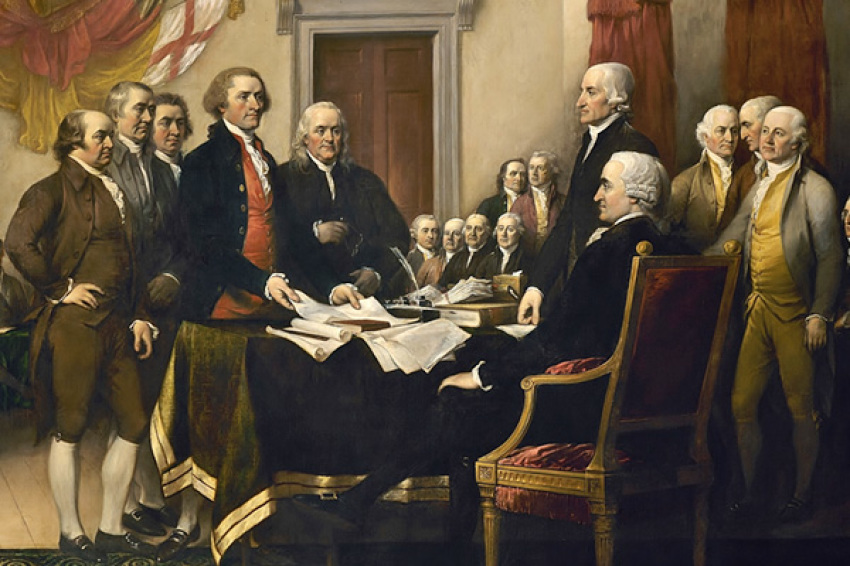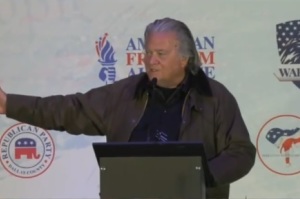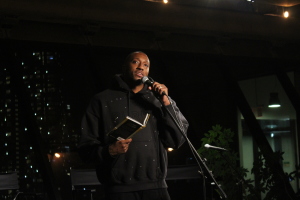Theologians who argued for limits of state power

Reverend Samuel Rutherford not only articulates specific jurisdiction of authority in 1644 in his treatise on just government, Lex, Rex, but he also uses direct Biblical references for his arguments on government and its responsibilities and limitations. Taking from the New Testament book of Romans, Rutherford writes, “No prince [government] hath a masterly or lordly dominion over his subjects, but only a free, ingenuous, paternal and tutorly oversight for the good of the people. (Rom. Xiii. 4.).” The clergy of the 1600s and 1700s of colonial New England believed and preached that the only just government was founded on compact, or covenant, and based on Scripture where reason and nature emanated revelation as the voice of God.
Francisco Suarez, one of the Salamancan theologians who had a profound influence on modern free-market schools of economics such as that of Adam Smith and of the Austrian School, in the early 1600s proclaimed that a ruler’s power in no sense is divine prudence. His reasoning was political power was a result of the people and their will under natural and divine law. In his research Murray Rothbard reports, “Suarez believed that natural law requires some form of state, the sovereign power of any particular state ‘must necessarily be bestowed upon him by the consent of the community.’” Suarez also believed in people’s right to rebel against tyrants, and even, under certain very extreme conditions of tyranny, assassinate the king. And, no, I am not arguing for such actions in our situation. We should use ballots not bullets.
Essentially, as Locke also later articulated, political sovereignty resides in the individual since each is a Child of God. This same theological view was also shared by another great Salamancan; the feisty Juan de Mariana. The fiery Mariana would conclude, as if he was describing the behavior of the American government today, that those in political power, such as a king, could suffer assassination or removal from their position upon consent of the governing when:
[A tyrant] seizes the property of individuals and squanders it, impelled as he is by the unkingly vices of lust, avarice, cruelty, and fraud…try to injure and ruin everybody, but they direct their attack especially against the rich and upright men throughout the relm. They consider the good more suspect than the evil; and the virtue which they themselves lack is most formidable to them…They exhaust all the rest so that they can not unite by demanding new tributes from them daily, by stirring up quarrels among the citizen, and by joining war to war. They build huge works at the expense and by the suffering of the citizens.
Who could fail to see a parallel between Mariana’s condemnation of a government spending at the expense of and by the suffering of the citizens? I would also add that Mariana’s Treatise on Money speaks directly to our time in its condemnation of inflationary policies of monetary debasement. By any commentary today on American political practices, Mariana is speaking of the present, not just the late 1500s and early 1600s.
Some claim that the Constitution is the dominant document. This is nonsense. The Founders left direct connections. On the Great Seal of the United States, at the bottom of the pyramid, the year 1776 is depicted in roman numerals (MDCCLXXVI). The seal was adopted in 1782. While the last paragraph of the Constitution states in the Year of our Lord one thousand seven hundred and Eighty seven and of the Independence of the United States of America the Twelfth. The signers of the Constitution are signifying that it is being ratified in the 12th year of the existence of the United States, or the 12th year since the ratifying of the Declaration of Independence. Therefore, the framework and power instituted within the Constitution is directly reliant and subservient to that framework and power which is recognized by the Declaration, since it is recognizing natural rights established by God. As economist Jerry Bowyer so eloquently and succinctly writes, “If the Declaration no longer applies; then the government of which you are a part no longer possesses legitimacy; which means you have no authority in the first place and therefore have no right to demand that we obey.” Bowyer, however, did argue vigorously that our current times do not call for violent revolt.
James Madison signifies that the rights clarified in the Constitution, more specifically, the Bill of Rights, originate in Natural Law, or natural rights, established in the Declaration at the founding of our country. Madison writes, “The rights specified or recognized under all the state constitutions, as well as a plain denial of the fundamental principle on which our independence itself was declared.” Madison uses “recognized” in this statement as these rights pre-existed the Declaration of Independence and the founding of our country, as they were established by God upon the creation of man.
Natural Rights have historically correlated to Natural Law; used interchangeably in writings and oration for centuries. As the great Cornell University historian of medieval church history and law, Brian Tierney, wrote in his in-depth treatise, The Idea of Natural Rights, “One finds natural rights regarded as correlative with natural law at every stage in the history of the doctrine… it was a characteristic product of the great age of creative jurisprudence that, in the twelfth and thirteenth centuries, established the foundations of the Western legal tradition.” Natural rights and law were certainly considered one in the same throughout America’s Colonial history in both discourse and practice.
In fact, James Madison, as a Representative from Virginia, reinforced this before Congress stating, “First. That there be prefixed to the constitution a declaration – That all power is originally vested in, and consequently derived from the people. That government is instituted, and ought to be exercised for the benefit of the people; which consists in the enjoyment of life and liberty, with the right of acquiring and using property, and generally of pursuing and obtaining happiness and safety. That the people have an indubitable, unalienable, and indefeasible right to reform or change their government, whenever it be found adverse or inadequate to the purpose of its institution.” The Founding Father, often referred to as the Father of the Constitution, directly states that the Declaration precedes the Constitution establishing Fundamental Rights as the rights to which the Constitution is to uphold and cannot usurp. It affirms how the purpose of the Constitution is to protect alienable rights under the Natural Law of God.
As researcher and law professor George Leef accurately and tragically writes, “Few Americans have much understanding of our Constitution any more. It’s seldom covered in school or college, and law students get a course called “constitutional law” that isn’t really about the document itself, but about the Supreme Court’s many decisions – decisions that often changed its intent.”
Brutus, in the Anti Federalist Papers, issued this very warning, foretelling that “all that is reserved for the individual States must very soon be annihilated. […] This disposition, which is implanted in human nature, will operate in the Federal legislature to lessen and ultimately to subvert the State authority.” Brutus was off on his timing but spot-on with his concern.
Jim Huntzinger is the President and Founder of Lean Frontiers, Inc., which develops knowledge and learning communities on the Lean Enterprise for business and industry. With a background and experience in manufacturing and operations, he has also extensively researched the history and development of American manufacturing and also published several books on the lean business model, manufacturing history, and economics.



























